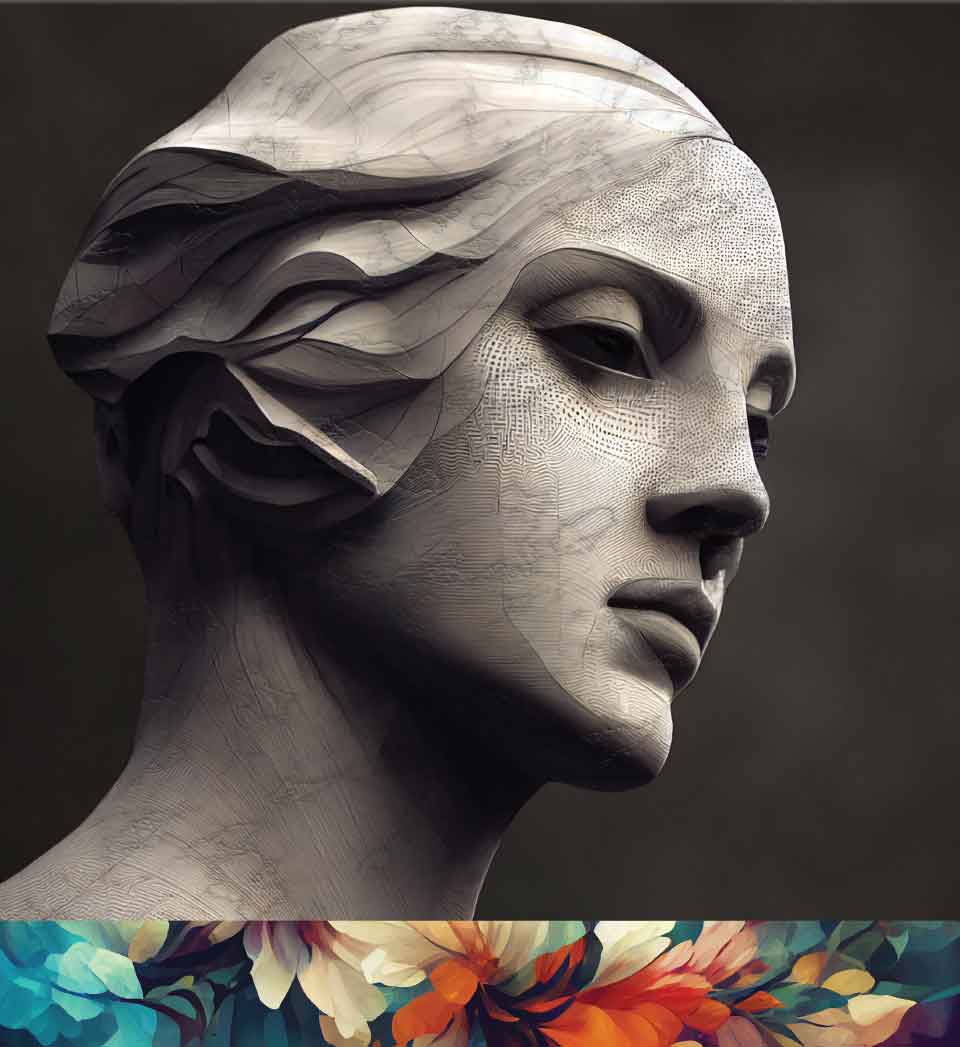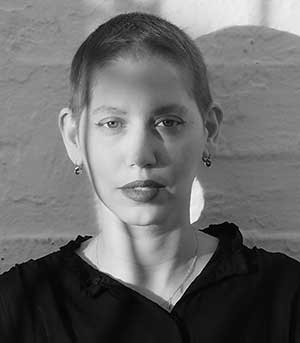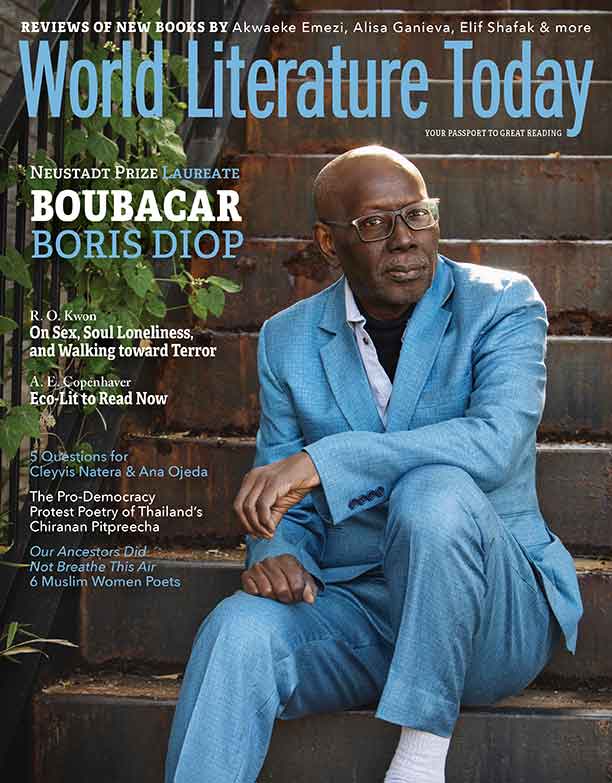“I write poems to create space in language for hope”: A Conversation with Danae Sioziou

Danae Sioziou (b. 1987) was raised in Germany and Greece and works as a cultural manager and educator. Her books to date include Useful Children Games and Probable Landscapes, published by Antipodes Editions. Her first poetry collection was awarded both the Writers’ Society “Yannis Varveris” Prize for Young Authors and (ex aequo) the State Literary Prize for New Authors. Sioziou was, for several years, co-editor of the poetry journal Teflon. Her poetry has been translated into more than twenty languages, anthologized (e.g., by Karen Van Dyck in Austerity Measures, 2016), and presented at numerous festivals and other events in Greece and abroad. She is a member of Versopolis, PEN Greece, and the Book History Hub at the National and Kapodistrian University of Athens. She has facilitated many artistic, cultural, and educational projects in Greece and in Europe collaborating with local and international institutions.
 Adam Goldwyn: Many anglophone readers, myself included, first came across your work in the 2016 anthology Austerity Measures, which framed what the editor Karen Van Dyck called in the subtitle “the New Greek Poetry” around the economic crisis of 2008, when you were in your early twenties. How did coming of age during the economic crisis shape your poetry? How has your poetry changed as the economic crisis has become less acute?
Adam Goldwyn: Many anglophone readers, myself included, first came across your work in the 2016 anthology Austerity Measures, which framed what the editor Karen Van Dyck called in the subtitle “the New Greek Poetry” around the economic crisis of 2008, when you were in your early twenties. How did coming of age during the economic crisis shape your poetry? How has your poetry changed as the economic crisis has become less acute?
Danae Sioziou: It has been fifteen years since the beginning of the economic crisis. Back then I was a student and co-editor of the literary journal Teflon. I have worked since I was eighteen years old to support myself, and the crisis only made my life more difficult. I think the crisis shaped my hopes and dreams and fears, but not in a flourishing way. I tried to understand who I was as I witnessed how people all around me were—and still are—struggling with profound and often disorienting economic, cultural, political, and social insecurity.
The crisis in Greece and the media attention it generated increased global interest in all things Greek, but it also imposed certain exoticizing, reductive, and colonially inflected frameworks. It is a fact that things like Greek cinema and anthologies of recent Greek poetry in translation—such as those by Karen Van Dyck and Theodoros Chiotis—have reached broad English-speaking audiences. The Greek arts scene has been said to have flourished during the crisis, but I resist this idea. “Crisis” is more than a term; it is a gaze and a framing that enables certain narratives of the present while excluding others.
It’s a cliché that art thrives in times of crisis. Artists, for example, need money, and money is time out of your life. I have always felt that this cliché underestimates and dehumanizes artists. Sometimes certain works of art shape the grounds for critique and resistance to hegemonic power and foster alternative languages and radical artistic and social imaginaries. But a crisis can also destroy voices. In Greece, for example, there is almost no literature produced by second- or third-generation immigrants. This is a huge loss. Yes, we can call it a crisis, but that means it requires both critical thought and creative and sustained interventions, and what followed the crisis of 2008 was far away from that.
“Crisis” is more than a term; it is a gaze and a framing that enables certain narratives of the present while excluding others.
Goldwyn: One of the tensions that I find so engaging is that your poems are not explicitly political but still respond to the current political and economic moment. “Poem for My Birthday,” to me anyway, shows how even passing the time on your birthday is shaped by invisible political forces; the narrator is literally covered in bills and tax forms, fielding calls from debt collectors, despairing yet resilient. How do you, as a poet, balance writing in and about a specific cultural moment in a way that can still be understood by a global audience not familiar with the Greek economic crisis, or even future generations of Greek readers who will not have lived through it?
Sioziou: I write poems to create space in language for hope. In Probable Landscapes, I wanted to challenge the emphasis that liberal thought places on individualism. I focused on inner and outer landscapes, exploring the relation to land, to ancestors, to others, and to the world. This kind of relation allows for an extended sense of selfhood and belonging. It is an exploration of the art and craft of poetry in terms of creating your own inner map, voice, and mythology. It combines modern and traditional means and themes along with an understanding of poetic rhythm and a vivid narrative style.
I write poems to create space in language for hope.
Goldwyn: “Poem for My Birthday,” like much of your work, reminds me of Kiki Dimoula, the second woman (and first female poet) elected to the Academy of Athens, for whom just being a woman writing poetry about women’s daily lives was in some sense a radical-feminist political act. Is writing about a woman paying her own bills—or, as in “Poem for my Birthday,” struggling to pay the bills—still a feminist act? Do you think of your work within the long tradition of Greek poetry, perhaps even as offering a feminist critique of a Greek poetic tradition that has been dominated by men writing about history, myth, war?
Sioziou: Kiki Dimoula was a great poet; her work constitutes an important part of the national curriculum, and she is a definite influence, especially in my early work. I am very interested in understanding the voices of the past, listening to them, remembering them, and I have long studied the work of women poets from previous decades. However, today I feel closer to contemporary women poets, and their work offers me great inspiration.
When I wrote this poem, “Poem for My Birthday,” I wanted to write a funny, bittersweet poem about my birthday playing with the idea of birthday goals and “birthday as a motivational fresh start” in the individualistic and antagonistic neoliberal reality where everything is measured in terms of success, self-improvement, self-care, etc. The critique of individualism in general reengages feminist critiques of liberal individualism and of masculine norms of self-sufficiency.
In my poetry, I consciously emphasize gender roles quite often because the so-called gender bias in Greece (as well as elsewhere) is still very strong. Gender is one of the central themes of my poetry, which also touches upon themes of language, imagination, oppression. I also write a lot about history, about myth, and about war, and writing on those themes is often a feminine act as well. I can’t keep from talking about what hurts. I try to compensate for it by creating dialogues between light and darkness, humor and irony, mythology and mundane reality. Like the hero of “Poem for My Birthday,” in my poetry I also often resist death and finality. However, after my recent brush with death I had to explore mortality, illness, and poetry in a very different way than I used to.1
Goldwyn: I see this feminist critique as another instance of the way in which your poetry is political without being political in “My Best Friend Is in Love with You,” where the narrator demands that her best friend’s beloved “build her a house”; this is not a particularly political statement, except in considering it as written against the housing and debt crisis in Greece and as a response to cultural norms about gendered expectations in marriage. When you sent me the poem, you told me that it is “in direct conversation with Hera Lindsay Bird’s 2018 poem ‘I want to get high my whole life with you’”: “on the level of the word, this is most evident in my line ‘you must build her a house,’ which invokes Bird’s parallel ‘and make you a beautiful house to live in.’”2 In Bird’s poem, however, she builds the house, but in your version, it is still the (presumably male?) beloved who should build the house, so there is a critique here both of economics—the difficulty of building a house during a debt crisis—and of gender—the expectation that a man provides for his wife. I think this shows something defining about the “New Greek poetry,” which is how it engages with viral internet poetry and how traditional language barriers don’t seem to bother increasingly polyglot and cosmopolitan younger poets. Is that true? How are international influences changing Greek poetry?
Sioziou: Unlike other countries, in Greece we have yet to see multicultural and multiethnic writers. I mean, yes, I was raised in two countries, and there are a few other examples of writers who are first- or second-generation immigrants, but what we don’t hear about are the stories of the generations of immigrants and refugees that have been arriving in Greece during the last few decades. We have minorities from Africa, the Philippines, Syria, Afghanistan, Iraq, and elsewhere, but where are their stories?
Greek poets are being translated, they collaborate, and they are members of communal initiatives and solidarity groups; they serve as distinguished members of creative platforms and organizations. Technology, social media, and the internet in general enable new forms of creative initiatives, communication, exchange of ideas, and gathering. The local interweaves with the global the way we experience it in our daily lives. Underrepresented minorities make use of such opportunities, but they remain underrepresented.
In Greece we lack a national book policy and national book center as well as decentralized facilities and organizations that would offer support and opportunities to writers that come from or live in the provinces, to writers of underrepresented minorities. The state as well as private institutions have been reluctant to offer financial aid, scholarships, or fellowships to writers, although they play a vital role in shaping the cultural assets of the country, its global representation, and its social, political, and artistic future as well. As for myself, I am a member of the Book History Lab in the National and Kapodistrian University of Athens, of the Versopolis poetry platform, and I collaborate with groups and institutions that facilitate cultural and educational initiatives. I am currently working on a new project that will hopefully allow me to fulfill some of my dreams for the future.
Goldwyn: Speaking of institutions that facilitate cultural and educational initiatives, this interview is in many ways a follow-up to a conversation we never had when we met at a dinner after the 2022 Onassis Foundation summer school on Constantine Cavafy—we were introduced by first names, and I didn’t realize at the time you were the Danae Sioziou. But in many ways, I see you and your poetry as the kind of mirror-image of Cavafy: like him, you are a polyglot poet born outside the Greek nation, but Cavafy was kind of the last diasporic writer at the moment when the nationalist idea of Greekness was collapsed to include only those within the borders of the modern Greek nation. Yet you and other younger Greek poets are writing at a moment when this nationalist Greekness is being challenged, as you say, by immigration to Greece, and by the new diaspora of Greeks into the EU and beyond. I see a lot of these tensions, for instance, in your poem “Berlin,” which largely takes place in a taxi in Germany, with the driver discussing the consequences of immigration, economics, and education. As a writer in Greek, born in Germany, fluent in English, writing (like Cavafy) for domestic and international audiences, what does it mean to be a Greek poet?
Sioziou: Yes, the Onassis Foundation summer school devoted to Cavafy is part of a range of educational programs directed at Greek and international academic communities and the general public. A few years ago, I designed the workshop “A poem, an image, an edition,” led by a poet and an artist, for the educational program “Cavafy Goes to School,” which was addressed to middle- and high-school students. In this workshop, students would read Cavafy’s work, get inspired by his poetry, and create their own handmade illustrated editions.
Cavafy was an Alexandrian Egyptian Greek poet, but I have never been to Egypt. I was planning to go this past year, but cancer changed my plans. I was going to visit my dear friend Nourhan Maayouf, who is an Egyptian artist, and explore Egypt with her.3 I was looking forward to this trip also because of the poetry of Cavafy. I have studied his work, I have taught his poetry in many different contexts, but the place where he lived remains out of reach for me. I understand that his world is not there anymore, but I would like to smell the air, the food, and look at the some of the landscapes he looked at. I would like to talk about his poetry with contemporary artists from Egypt. Nourhan and I were thinking of designing a cooking and poetry workshop and some other projects inspired by the poetry of Cavafy. I hope to make it this year if my health allows it.
But I don’t know what it means to be a Greek poet or a poet who writes in Greek. It certainly means you write in a language spoken by very few people. Language in general is an important issue for me since I am trilingual. I grew up in Germany and Greece and studied English. I also speak Spanish and have studied French and Turkish.
It would be important to understand poetry and arts in general as means to foster a space for alternative, unpredictable futures, beyond the limited probabilities of our present, as we search across politics, economics, psychology, and religion for sources of our current problems. Poetry and literature in general can offer another way of thinking about the world, of living together, of drawing attention to our interdependency and our need to support one another across sometimes quite radical differences. The pandemic and the feminist movements—in Iran right now, for example—show that we need global solidarity. We should hold out hope for the unexpected and use imagination to reverse the right-wing trend of our present. To be a poet today is to create space in language for hope and justice.
We should hold out hope for the unexpected and use imagination to reverse the right-wing trend of our present.
Goldwyn: As a translated writer and as a polyglot poet, how do you see your poetry within a cosmopolitan world literature read largely in English translation? Do you feel an obligation in your poetry to represent Greece or Germany or Greek Germans, or to represent or challenge a particular vision that English and international readers might have of Greece and Greeks?
Sioziou: I studied literature and history, which in turn cultivated my tendency to tell stories. It was a family thing as well; I was raised in a large extended family, some of whose members emigrated, so a very common habit in every gathering was storytelling. I believe storytelling bridged the gap between the pre-industrial landscapes of my parents’ village and the postmodern, capitalistic lifestyle that came after. It serves as a doorway into parts of their lives I have never known; those stories of survival are a powerful testimony.
I also think it is quite common. Language serves many different purposes in my writing. In reality, one part of the writer’s work is to trust the words and another is to manipulate them, because language shapes our brains and our reality before we can perceive it. For me, poetic language is a conduit of freedom. Sometimes I work on a piece whose language needs no mediation to reach the reader—which is actually quite difficult to achieve—and other times I allow words to do as they wish and trust the flow before I trust the meaning. I also enjoy using the banal and clichéd elements from everyday life alongside unexpected words or to express unexpected themes. These serve as good-natured pranks but also allow me and my poetic language to become more vulnerable and tender.
The only obligation I feel is to write poems good enough for someone to read without feeling it was a waste of time.
October 2022
Three Poems
by Danae Sioziou
translated by Adam J. Goldwyn
Poem for My Birthday
When it’s my birthday, I want to sleep all day long
covered in bills, W2 forms, postcards,
and I want to cry, but since I am not a crybaby,
I simply say that I will faint and then go to sleep.
Because a birthday after thirty is
like when they surreptitiously open your mail
like when you try to park
and you have blocked traffic
it’s like getting a call from the debt collectors
whether you have a car, children, spouse, dog
or not, a birthday after thirty
is like you are waiting to shop the clearance sale
and you can’t find anything in your size
in general terms it’s not your fault
when it’s my birthday I’m an answering machine
without space for new messages,
someone who hitchhikes on the wrong side of the street,
when it’s my birthday I can’t remember
what’s the big deal
I’m unbearable
and I’m not at all afraid of metaphors
when it’s my birthday, I suddenly remember
that I want to live forever
and I ruin the party.
Burglary
As I open the door to my house,
I think that poetry is a privilege
like the expensive toys of childhood
or listening to your favorite song for the hundredth time
under ideal listening conditions
like kissing the love of your life
like millions of sparkling ponies
like life on other planets
like honey that dissolves completely in tea
like herds of lightning in the distance
and I like writing poems
as I like lying in the grass
eating cream with apricots, petting dogs
and even if people don’t like to hear poems
I like their sound
the way you put the words in order
the way you open the door holding the keys
to an inviolable house
I like writing poems
like cats like licking themselves in the sun
and I want to get good at this work
I want to get good at this work.
My Best Friend Is in Love with You
My best friend is in love with you
and you must build her a house
because she’s my best friend
and she’s in love with you
she aligns herself to your thoughts
just like the magi to the North Star
her every step follows this thought
magnetically drawn toward your constellation
like a temple complex
like a mathematical sequence
like a symphony
like end credits
like two hundred and fifty flavors of ice cream
like a collection of short stories, poems, butterflies, coins
like any collection it too requires
a fanatic or someone lost
she’s my best friend and when she falls in love
her hair floats up toward the sky
it expands, grows long
and joy gets bigger like the moon
3.8 centimeters per year
you must build her a house
because she’s my best friend
And she’s in love with you.
Translation from the Greek
Translator’s note: From Probable Landscapes (Antipodes Editions, 2021).
1 In January 2022 Danae was diagnosed with cancer but did not publicly reveal her diagnosis until September.
2 Hera Lindsay Bird (b. 1987) is a New Zealand poet.
3 Nourhan Maayouf (b. 1990) is a Swiss-educated, Cairo-based visual artist.














